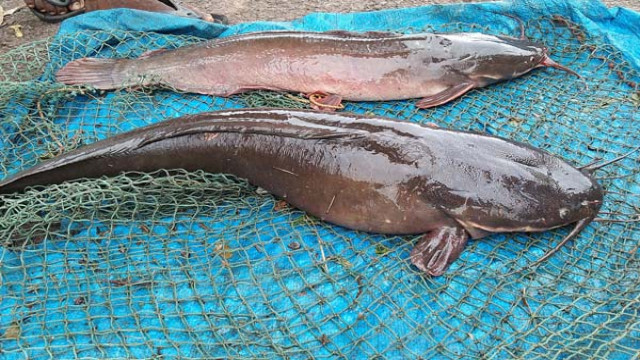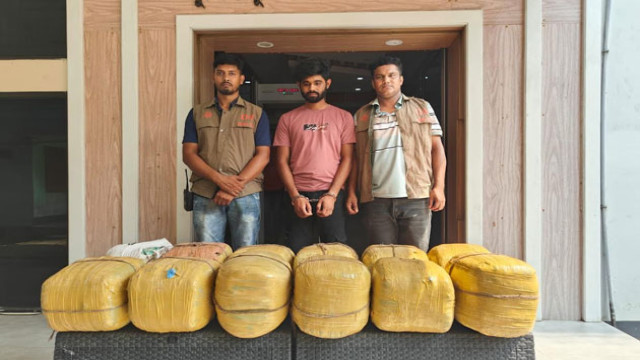Rajshahi, JUNE 03 (V7N) – Concerns are mounting in Rajshahi district over the widespread, clandestine sale of African catfish, locally referred to as "African maggots," despite a government ban in place since 2014. These invasive fish, often disguised as local Magur (catfish) due to their similar appearance when small, are creating a problem for local fisheries and posing potential ecological threats.
On Thursday evening, at Joypur Bazar, adjacent to Charghat and Puthia Upazilas, a large crowd gathered around fish trader Monirul Islam who was selling "local Magur" for only Tk 220 per kg. While the seller claimed to be sourcing them cheaply from Natore and assured they were 100% local, his reluctance to involve fisheries officials and subsequent plea for leniency raised suspicions. It was later revealed he was buying the African catfish from a farmer named Murad Ali of Baneshwar, Puthia. This comes after Executive Magistrate Arif Hossain and Upazila Fisheries Officer Asaduzzaman recently caught and fined another seller, Tabibar Rahman, Tk 4,000 for selling 80 kg of African catfish in Gobindapur market.
Despite such enforcement efforts, African catfish are openly being sold in markets across Charghat, Bagha, and Puthia Upazilas of Rajshahi. An organized syndicate is reportedly collecting fry of this fish from Jessore district and supplying them to remote villages. These fish are then cultivated in various ponds and even makeshift water bodies near homes and under bridges, and then supplied in large quantities to local markets. Their lower price compared to other fish makes them attractive to middle and low-income buyers, further fueling their market presence.
The Ministry of Fisheries and Livestock has banned the import, production, and marketing of African catfish since June 2014, with the Cabinet even approving a draft Fisheries Prohibition Act-2017 that includes prison sentences for importing African catfish, eggs, and fry. The primary reason for the ban is the African catfish's omnivorous nature, which poses a significant threat to local fish species by preying on them and their eggs.
Recent observations confirm the sale of African catfish at Mirganj Hat in Bagha Upazila and Baneshwar Hat in Puthia Upazila, where small-sized African catfish are being passed off as native Magur. Upazila fisheries officials explain that African catfish often have black spots on their bodies due to being cultivated in dirty water, a characteristic not found in native Magur. However, sellers often claim these spots indicate "bill fish" to authenticate them as native.
Distinguishing between the two species can be challenging for buyers, especially with smaller fish. Fisheries officials note that the African catfish has a larger head and belly, and wider jaws compared to the pointed head of the native Magur.
Mohsin Ali, a fish trader from Charghat, admits that many traders are unaware of the ban on African catfish. He described how these fish are being cultivated in small, informal water bodies. While larger African catfish (weighing up to 10-15 kg) are often sold to city hotels, the smaller ones (100-150 grams) are sold in local markets, often deceiving buyers. Ajibar Rahman, a farmer from Patiyakandi village in Charghat, recounted his experience where African catfish released accidentally into his pond consumed almost all his local fish fry.
A local fish farmer, wishing to remain anonymous, detailed the trade: African catfish fry are produced in Kazipur, Jessore, and delivered in plastic drums upon phone order, costing four to six taka per fry. These are then released into small, enclosed water bodies. Farmers have contracts with chicken shops to collect chicken entrails, fins, and fish entrails daily to feed these fish, allowing them to grow quickly and profitably with less food compared to other species.
Charghat Upazila Fisheries Officer Asaduzzaman reiterated the danger posed by African catfish: "These magurs can consume small and large fish, fish eggs, fry, and other aquatic animals in a matter of seconds. If these fish somehow escape into rivers or open water bodies, they can cause disaster for the fish resources and the environment." He confirmed that regular monitoring is being conducted in markets to prevent the sale of this banned fish. Charghat Upazila Assistant Commissioner (Land) and Executive Magistrate advised buyers to be vigilant and confirmed that legal action, including fines, is being taken against violators.
END/RAR/RH/































Comment: